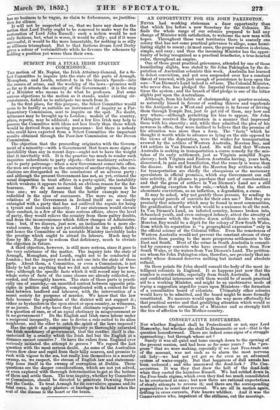AN OPPORTUNITY FOR SIR JOHN PA RINGTON. NEVER had working
statesman a finer opportunity than that which lies before a new Secretary for the Colonies. He finds the whole range of our colonies prepared to hail any change of Minister with satisfaction, to welcome the new man with hopes. Throughout those vast territories there is scarcely one colony that has not some practical grievance to allege, some humi- liating slight to resent; in most cases, the proper redress is obvious, simple, and easy ; and thus the incoming Minister has the oppor- tunity of being recognized as a practical benefactor, a true-hearted ruler, throughout an empire.
One of those great practical grievances, attended by one of those humiliating slights, was stated to Sir John Pakington by the de- putation of Australian colonists this week. Australia has learned to detest eonvictism, and yet sees suspended over her a constant threat of renewal, with just enough of persistence to keep open the sore—Van Diemen's Land indeed is all sore. The Colonial Minister, who never dies, has pledged the Imperial Government to discon- tinue the system ; and the breach of that pledge is one of the bitter slights put upon the Australians.
Although, from his habits of chairmanship at quarter-sessions, as naturally biased in favour of sending thieves and vagabonds to the Antipodes as a West-end policeman is in favour of driving them through Temple Bar, just to get rid of them, any how and any where,—although permitting his bias to appear, Sir John Pakington received the deputation in a manner that impressed them with his sincerity ; and, while they admitted the plea of his newness in office, they were inclined to believe that the promise of his attention was more than a form. The " facts " which he thought it worth while to advance as lying on the side opposed to the views of the deputation, were the wishes for transportation avowed by the settlers of Western Australia, Moreton Bay, and 144 settlers in Van Diemen's Land. He will find that Western Australia is seeking in transportation a coarse remedy for the mis- takes of its early settlement, just as Virginia accered Negro slavery; both -Virginia and Eastern Australia having, years back, discovered, in pain and humiliation, that the remedy is worse than the disease. He will find that the Moreton Bay settlers who call for transportation are chiefly the obsequious or the meree
speculators in official promises, which any Government can into activity, if it pleases to purchase that sort of corroboration ; and that the gross of settlers in Van Diemen's Land are a still more glazing exception to the rule,—which is that the settlers abominate convictism, as an infliction, a degradation, a curse.
It may be asked, why not gratify those persons, by sending to them special parcels of convicts for their own use P But they are precisely that minority which may be found in most communities, the gratification of whose wish would be a nuisance to all the rest. In Van Diemen's Land, an infested country, houses broken into, debauched youth, and even outraged infancy, attest the atrocity of the nuisance which the twelve dozen settlers desire to retain. Moreton Bay would be a depot for the colony of New South Wales, from which its separation is "a geographical expression" only in the official science of the Colonial Office. Even the remoteness of Western Australia would not prevent the constant stream of stray convicts from passing to the more prosperous settlements to the East and South. Most of the crime in South Australia is commit- ted by runaway convicts who have crossed the waste from New South Wales' or the waters from Van Diemen's Land. The petition- ers whom Sir John Pakington cites, therefore, are precisely that mi- nority whose demand deserves nothing but instant and absolute refusal.
On these points Sir John should consult the body of the most in- telligent colonists in England. It so happens just now that the number is considerable, especially from South Australia. A frank and confidential intercourse with them would be of much practical aid to a working Minister, and might be an unobtrusive mode of trying a suggestion urged for years upon Ministers—the formation of a consultative board of colonists. Ultimately other colonies would have to be admitted, and the board might be more formally constituted. No measure would open the way more effectually for that practical service and that gratifying attention which would so much enhance the estimation of a Minister and so strongly knit the ties of affection to the Mother-country.


























 Previous page
Previous page